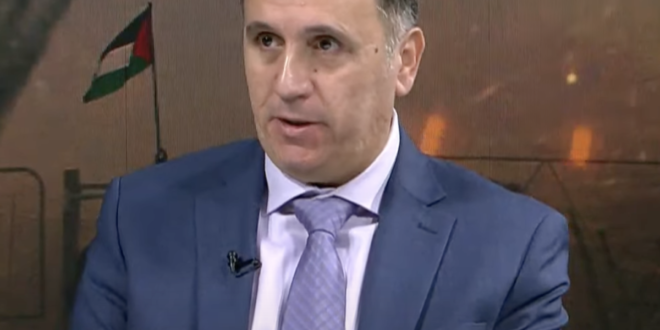Dr. Shehab Al-Makahleh
As the world grapples with the dramatic shifts in global power dynamics, two pivotal events have particularly reshaped the international landscape: the chaotic US withdrawal from Afghanistan and the Russian military operations in Ukraine. These incidents have sparked intense speculation about the decline of American leadership and the potential emergence of a new, multipolar world order.
Russian Foreign Minister Sergey Lavrov’s visit to the UN and his speech at the United Nation’s Security Council on July 16, 2024 and his upcoming proposal to the United Nations for a just world order and a new global security equation is a bold move that seeks to address the imbalances of the current international system.
The dramatic scene of the United States’ retreat from Afghanistan in the summer of 2021 opened the door wide to debates about the waning influence of American influence. This event, reminiscent of the American withdrawal from Vietnam in 1973, has fuelled discussions about the end of the unipolar world that Washington has dominated since the Cold War’s conclusion and the Soviet Union’s collapse in December 1991.
The crisis in Eastern Europe has heightened these speculations. The military operations represent the most severe military conflict in Europe since the Cold War and has been likened to a “September 11 moment” for the continent. This crisis followed closely on the heels of the American debacle in Afghanistan, suggesting a broader pattern of shifting global power.
China and Russia have strategically positioned themselves for this new era in international relations. On February 4, 2022, following a summit between President Vladimir Putin and his Chinese counterpart, Xi Jinping, the two leaders issued a joint statement declaring that international relations were entering a new era. They expressed concerns over the (Australia, United Kingdom and US alliance, arguing that it could spark an arms race and increase nuclear proliferation risks in the region.
The then joint statement highlighted the two countries’ commitment to multipolarity, regional cooperation and economic interdependence, with a central role for the United Nations and the Security Council. This statement came just 20 days before Russia’s operations in Ukraine, underscoring the close partnership between Putin and Xi. China abstained from voting on a United Nations General Assembly resolution condemning Russia’s military operation and avoided labeling it an “invasion”. Chinese Foreign Minister Wang Yi reiterated on March 7, 2022 China’s enduring friendship and mutually beneficial cooperation with Russia, rooted in what he termed “the clear logic of history”. This position reflects Beijing’s alignment with the Kremlin’s security concerns.
In 2017, Russian Foreign Minister Sergei Lavrov called for a new world order “not dominated by Western countries” during a security forum in Munich, advocating for a “pragmatic” relationship with the United States and a democratic and just international system, which he termed a “post-Western order”.
On June 14, 2024, in a significant speech at Russia’s foreign ministry, President Putin declared that the West’s current model of global security had collapsed and that it was essential to develop a new and more stable system in collaboration with Russia. This statement reflects a profound shift in the international security landscape and signals Russia’s intent to play a central role in shaping a new order.
Putin asserted, “Obviously, we are witnessing the collapse of the Euro-Atlantic security system. Today it simply does not exist, it needs to be essentially created anew.” This bold claim underscores the perceived failure of the existing security framework, which has been dominated by Western powers since the end of the Cold War. The unraveling of this model, according to Putin, necessitates the creation of a fresh approach that can better address contemporary global challenges.
The world, Putin noted, has reached a “point of no return” due to the deficiencies of the current system. He emphasised the need for a collaborative effort to establish a new security structure, stating, “All this requires us, together with our partners, with all interested countries, and there are many of them, to work out our own options for ensuring security in Eurasia, proposing them then for wider international discussion.” This call for inclusivity highlights Russia’s desire to engage a broad spectrum of nations in the creation of a security framework that transcends traditional geopolitical boundaries.
Central to Putin’s vision is the inclusion of European and NATO countries in the development of this new security architecture. He remarked, “It is important to proceed from the fact that the future security architecture is open to all Eurasian countries that wish to take part in its creation. ‘To all’ means European and NATO countries too, of course.” This invitation to traditionally adversarial nations signals a willingness to move beyond historical animosities and work towards a cooperative and comprehensive security system.
Putin’s emphasis on geographical realities further reinforces this point: “We live on the same continent. No matter what happens, you cannot change the geography, we will have to coexist and work together one way or another.” This pragmatic acknowledgment of the interconnectedness of Eurasian nations suggests that mutual cooperation is not just desirable but inevitable.
The implications of Putin’s statements are profound. The collapse of the Western-led security model and the call for a new order reflect a broader dissatisfaction with the status quo. This dissatisfaction is not limited to Russia; other rising powers and even some Western allies may share concerns about the effectiveness and fairness of the existing system.
The current geopolitical climate, marked by NATO’s confrontational posture and the growing alliance between Russia and China, underscores the urgency of rethinking global security. The prospect of an escalating arms race, particularly with the potential deployment of nuclear weapons, further complicates the situation and highlights the need for a stable and inclusive security framework.
Some observers view that Putin has initiated a challenge to the global order, while others believe that China will play a decisive role in shaping it. China’s strategies, particularly its foreign policies, vision of an alternative international order, and ambitious economic plans, will significantly influence the new global landscape. As Russia becomes increasingly economically dependent on China, Beijing will have a critical voice in the emerging international system.
This interdependence was highlighted by the oil and gas deals announced in February 2022, worth approximately $115.5 billion, which will allow Russia to increase its energy exports to China over the next 25 years. Additionally, Rosneft and the China National Petroleum Corporation have extended a deal to supply 100 million tonnes of oil over the next decade.
The geopolitical developments of the past few years have accelerated the shift towards a new world order. The strategic alliance between China and Russia, combined with the perceived decline of American influence, signals a profound transformation in global power dynamics. As these changes unfold, the international community must navigate an increasingly complex and multipolar world, where old alliances are tested and new partnerships are forged. The fate of the global order now hinges on the interplay between these rising powers and the existing structures of international governance.
 Geostrategic Media Political Commentary, Analysis, Security, Defense
Geostrategic Media Political Commentary, Analysis, Security, Defense





